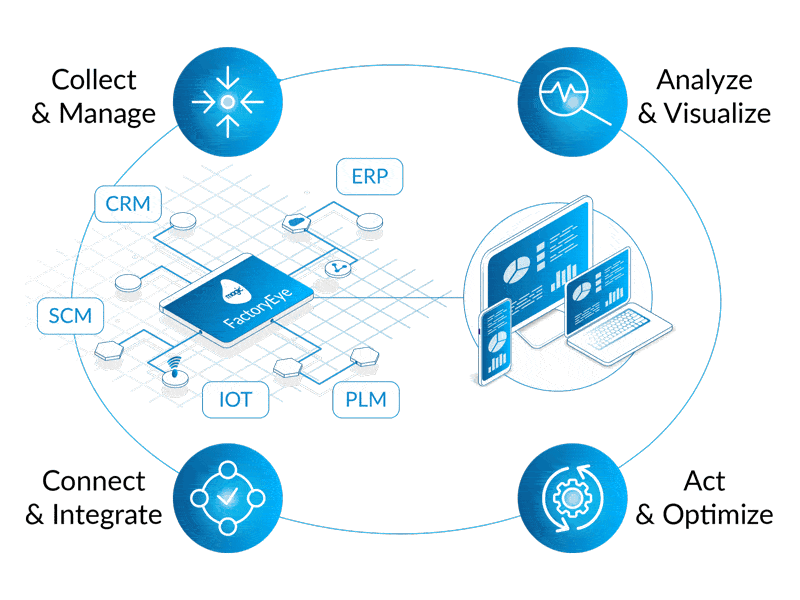Nov 2020

Manufacturing companies around the world are in the process of digital transformation. Industry 4.0 is fundamentally changing the models of industrial markets and increasing the competitiveness of their members. Thus, the level of digitalization determines the growth prospects of any manufacturing company.
Understand the benefits of digital transformation
Now, more and more manufacturing enterprises are investing not only in the automation of existing processes, but also in the implementation of new, breakthrough business models and technologies based on Industry 4.0, to improve their capacity in integration and maximize the use of their digital platforms. This kind of aggressive approach will only help in improving their digital ecosystems and allow companies to get in-depth analytics of big data, and wider implementation of the Internet of Things (IoT).
According to the
by 2025 the Internet of Things (IoT) applications could have a total economic impact of $11 trillion US dollars annually.
Implementation of Industry 4.0 technologies should be a priority for all manufacturers. By integrating production machines, business systems and their legacy systems, manufacturers can achieve much greater productivity and efficiency and become more agile and lean. The principle of Industry 4.0 is based on the massive introduction of information technology into industry, as well as large-scale automation of business processes.
The main goal of Industry 4.0 is to make manufacturing – and its related industries such as logistics – faster, more efficient, and more customer-centric. At the same time, moving beyond automation and optimization and discovering new business opportunities.
Manufacturing Digital Transformation and Prejudice
Many factories are lagging behind the rapid growth of new technologies. This can be explained by the cost of the equipment (which is very expensive to change to a new one), as well as by the fear of changing their production processes. Despite outdated technology and old machines, they still work and play a main role in the entire manufacturing business.
Often, manufacturing executives think they cannot do anything with their old equipment, which may have been made even before the Internet. Therefore, they continue to use these bulky and expensive to maintain production machines. Moreover, older technologies cannot provide complete real-time data.
The lack of real-time information makes it difficult to make decisions and prevents executives from successfully developing further and competing on an equal footing with more technologically advanced competitors in the market.

Meanwhile, the erroneous assumption about the need to replace all equipment drives them away from increasing productivity and taking full advantage of the integration of new technologies into production. We have a solution that can help any factory and any production!
Transformation of Legacy Systems with FactoryEye
All factories have different resources, strengths and weaknesses, and unique capabilities. However, there are proactive and proven solutions that can be applied across all industries, even with legacy systems and old equipments, to accelerate IT transformation.
FactoryEye is a unique solution capable of fully integrating all IT systems in your company (ERP, CRM, PLM, MES, WMS, SCM) with manufacturing production machines. It provides complete visibility and analysis of operational processes in real time.

With FactoryEye, all critical and disparate data is visible and accessible in real time. Most importantly, you do not need to change existing manufacturing machines, existing systems and infrastructure to do this.
Why transformation of legacy systems is useful in the Manufacturing?
Reduces operating costs. IoT sensors monitor hard-to-reach parts and signal hazards, record fuel consumption, monitor equipment temperatures, and automatically alerts when something goes wrong.
Reduces labor costs. Employees receive the necessary data using sensors and cameras. They don’t have to go anywhere anymore to take the readings off the equipment or request information from colleagues.
Reduces the risks of accidents and, accordingly, the costs of eliminating the consequences. Devices and sensors have learned to predict abnormal situations or accidents.
In other words, the optimization of processes and productivity is the first advantage that manufacturers enjoy. In addition to cost savings, increased profitability, reduced waste, automation to avoid errors and delays which results in a faster production.
Look for an IT service provider with hands-on experience.
To help in such concept implementation, a manufacturing company should team up and partner with service a provider who can share their own experience in implementing digital transformation projects for manufacturing world, based on Industry 4.0
An experienced IT provider with such an engineering expertise, will be able to define project path and actions, recommend the best procedures and services, and help you find the best way to transform your factory to gain new benefits. If the project is planned and executed correctly, it will lead to increased profits and quicker ROI.
To learn more about how our solutions can help your business overcome manufacturing challenges, contact us today










